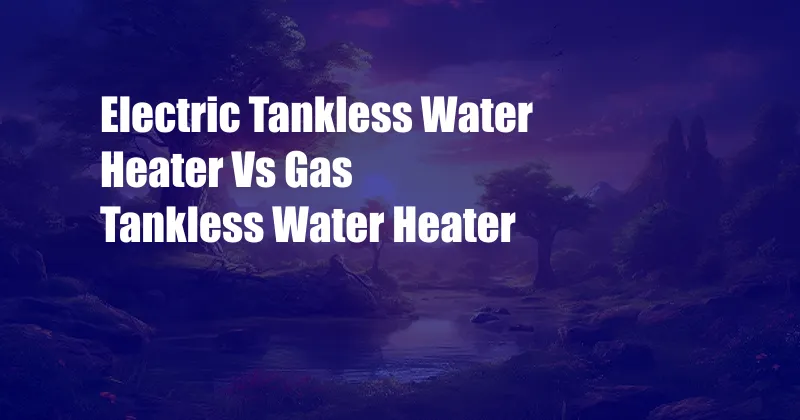
Electric Tankless Water Heaters vs. Gas Tankless Water Heaters: Uncover the Ultimate Guide
In the realm of home appliances, water heaters stand as unsung heroes, tirelessly providing us with an uninterrupted flow of warm water for showers, baths, and countless other daily tasks. As technology relentlessly advances, the once traditional tank-style water heaters have given way to a new breed of innovation—tankless water heaters. These space-saving marvels offer a host of benefits, but which type—electric or gas—reigns supreme? Embark with us on an in-depth exploration as we delve into the world of electric vs. gas tankless water heaters, equipping you with the knowledge to make an informed decision for your home.
Decoding Tankless Water Heaters: Unveiling the Concept
Unlike their cumbersome tank-bound counterparts, tankless water heaters operate on a revolutionary principle. As the name suggests, they lack any storage tank, instead heating water on demand. This ingenious design eliminates the need for constant water heating, significantly reducing energy consumption and standby heat loss. Whether you’re looking to conserve energy, free up valuable space, or enjoy endless hot water, tankless water heaters offer a compelling solution.
Electric Tankless Water Heaters: Harnessing Electrical Energy
Electric tankless water heaters draw their power from electricity, utilizing heating elements to raise the temperature of water. They are renowned for their compact size, making them ideal for cramped spaces or homes with limited storage capacity. Installation is relatively straightforward, as they simply require an electrical connection. Electric tankless water heaters are particularly advantageous in areas with low natural gas availability or where electricity rates are favorable.
Gas Tankless Water Heaters: Tapping into the Power of Combustion
Gas tankless water heaters, on the other hand, harness the energy from natural gas or propane to heat water. They feature a burner that ignites when hot water is demanded, efficiently heating the water as it flows through a heat exchanger. Gas tankless water heaters typically offer higher flow rates and faster temperature recovery compared to electric models. However, they require a dedicated gas line and proper ventilation, which may pose some installation challenges in certain scenarios.
Choosing the Right Tankless Water Heater: A Comparative Analysis
The choice between an electric or gas tankless water heater hinges on several key factors:
- Energy Costs: Gas tankless water heaters generally have lower operating costs in areas where natural gas prices are competitive. However, electricity rates vary considerably by region, so it’s essential to assess local utility costs before making a decision.
- Flow Rate: Gas tankless water heaters typically deliver higher flow rates, making them ideal for households with multiple bathrooms or high hot water demand. Electric models may struggle to meet peak demand in larger homes or those with simultaneous hot water usage.
- Installation Complexity: Electric tankless water heaters are typically easier to install than gas models, as they do not require a dedicated gas line or ventilation. Gas tankless water heaters require professional installation by a licensed plumber, which may incur additional costs.
- Availability: The availability of natural gas or propane in your area may influence your choice. If natural gas is not readily available, an electric tankless water heater may be the only viable option.
Expert Insights: Tips for Enhancing Water Heater Performance
To maximize the efficiency and longevity of your tankless water heater, consider these expert tips:
- Proper Sizing: Determine the appropriate tankless water heater size for your household’s hot water needs. An oversized unit will waste energy, while an undersized unit will struggle to meet demand.
- Regular Maintenance: Schedule regular maintenance with a qualified technician to ensure optimal performance and prevent costly repairs. Maintenance typically includes descaling, cleaning, and filter replacement.
- Insulation: Insulate hot water pipes to minimize heat loss and improve efficiency. Insulation can be particularly beneficial in cold climates or for pipes that run through unheated areas.
- Low-Flow Fixtures: Install low-flow showerheads and faucets to reduce water consumption and save energy. Low-flow fixtures can significantly lower hot water demand, allowing your tankless water heater to operate more efficiently.
Frequently Asked Questions about Tankless Water Heaters
To further illuminate the world of tankless water heaters, let’s address some common questions:
- Q: How long do tankless water heaters last?
A: Tankless water heaters typically have a lifespan of 20-25 years, which is comparable to tank-style water heaters.
- Q: Can tankless water heaters produce enough hot water for a whole house?
A: Yes, tankless water heaters can provide an endless supply of hot water, as long as they are properly sized for the household’s demand.
- Q: Are tankless water heaters energy-efficient?
A: Yes, tankless water heaters are highly energy-efficient as they only heat water when needed, eliminating standby heat loss.
- Q: Which type of tankless water heater is best for cold climates?
A: In colder climates, gas tankless water heaters are often preferred due to their higher flow rates and faster temperature recovery.
Conclusion
Whether you’re seeking energy savings, space-saving solutions, or an endless supply of hot water, tankless water heaters present a compelling choice. By understanding the distinct advantages of electric and gas tankless water heaters, you can make an informed decision that aligns with your home’s needs and budget. Embark on the path to hot water independence today and experience the transformative power of tankless technology.
If this article has piqued your curiosity and you’re eager to delve deeper into the world of tankless water heaters, we encourage you to explore additional resources, consult with industry experts, and make an informed decision that empowers you with the perfect hot water solution for your home.